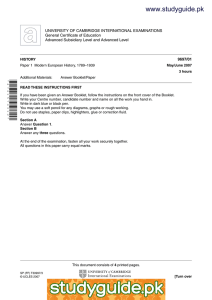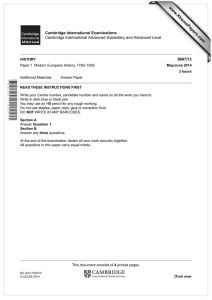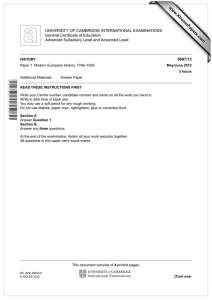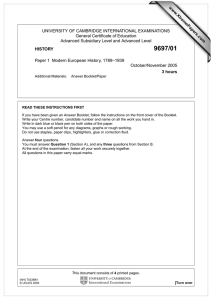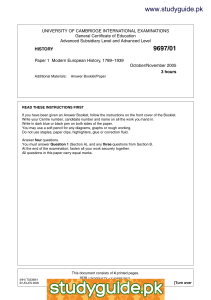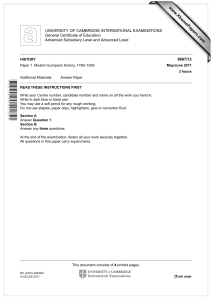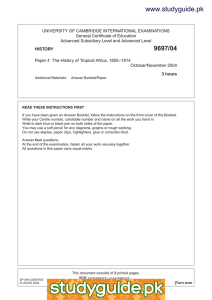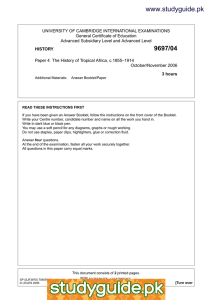www.XtremePapers.com
advertisement
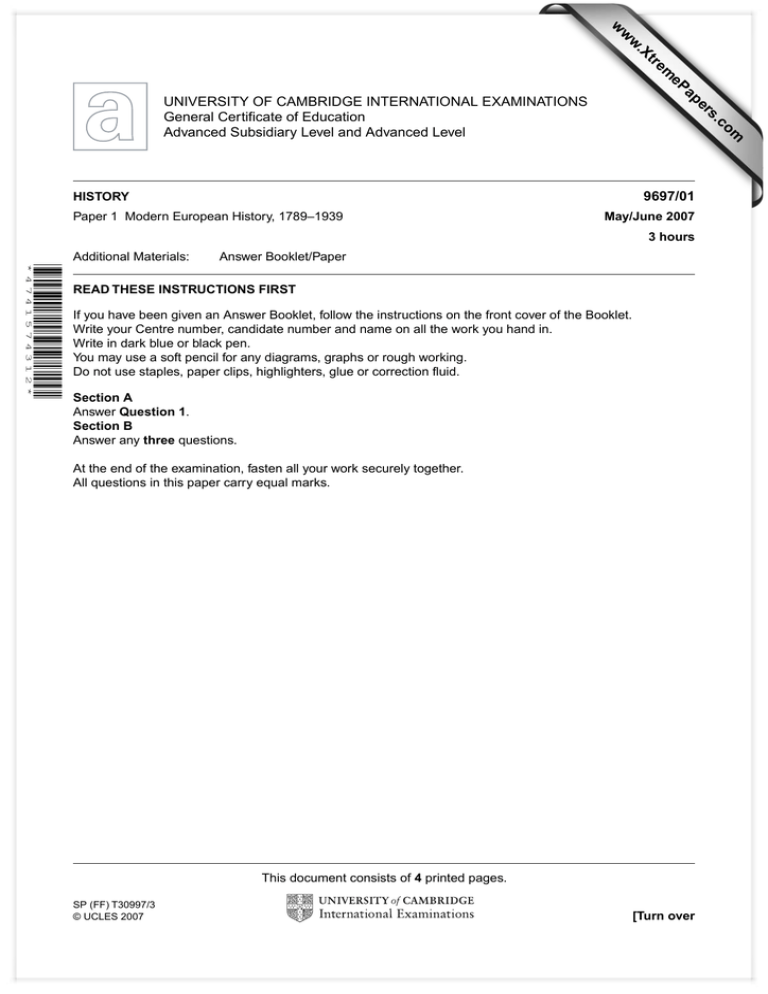
w w ap eP m e tr .X w om .c s er UNIVERSITY OF CAMBRIDGE INTERNATIONAL EXAMINATIONS General Certificate of Education Advanced Subsidiary Level and Advanced Level 9697/01 HISTORY Paper 1 Modern European History, 1789–1939 May/June 2007 3 hours Additional Materials: Answer Booklet/Paper *4741574312* READ THESE INSTRUCTIONS FIRST If you have been given an Answer Booklet, follow the instructions on the front cover of the Booklet. Write your Centre number, candidate number and name on all the work you hand in. Write in dark blue or black pen. You may use a soft pencil for any diagrams, graphs or rough working. Do not use staples, paper clips, highlighters, glue or correction fluid. Section A Answer Question 1. Section B Answer any three questions. At the end of the examination, fasten all your work securely together. All questions in this paper carry equal marks. This document consists of 4 printed pages. SP (FF) T30997/3 © UCLES 2007 [Turn over 2 SECTION A: THE ORIGINS OF WORLD WAR I, 1870 – 1914 You must answer Question 1. GERMAN FOREIGN POLICY BEFORE WORLD WAR I 1 Read the sources, and then answer the question. When answering Question 1, candidates are advised to pay particular attention to the interpretation and evaluation of the Sources, both individually and as a group. Source A The world is now dominated by the economic struggle. Central Europe is getting too small and the free expansion of peoples who live there is restricted, above all, as a result of the world domination of Britain. European countries are threatened with further restrictions both in trading activity and in the opportunity to send their surplus population to colonies. The war which could – and many say must – result from this situation would have the aim of breaking Britain’s world domination in order to allow for the necessary colonies for the central European countries who need to expand. Memorandum from Admiral Muller to Prince Henry, brother of Kaiser William II, 1896. Source B Called to a meeting with His Majesty, William II, Admiral Tirpitz, Vice-Admiral Heeringen and General Moltke, Chief of the German General Staff. His Majesty said, ‘Austria must deal energetically with Serbia. If Bulgaria, Rumania and Turkey join Austria, we shall be free to fight the war with full fury against France. The German navy must naturally prepare itself for war against Britain. Therefore, we must make plans for immediate submarine warfare against British troop ships and for mines in the River Thames.’ Tirpitz was ordered to ensure the speedy build-up of U-boats etc. Moltke said, ‘I believe a war is unavoidable. But we ought to do more through the newspapers to make a war against Russia more popular, as the Kaiser has suggested.’ His Majesty agreed with this and told Tirpitz to use his contacts with the newspapers to do so. Diary of Admiral Muller, 12 December 1912. Source C The Prince Regent of Bavaria [an important German state] told me in the last few weeks that it was generally believed that the Kaiser was pressing for war. I denied it completely. The Prince Regent further expressed the fear that His Majesty was planning an invasion of Britain. I asked him in amazement where he had got this utterly false information. He answered that he knew from an absolutely trustworthy military source – which he, however, refused to name – that His Majesty had ordered the working out of a plan for the invasion of Britain. I firmly assured the Prince Regent that Germany’s policy, and the Kaiser’s personal intentions to Britain, are far from being aggressive. Private notes by Bethmann-Hollweg, German Chancellor, 20 December 1912. © UCLES 2007 9697/01/M/J/07 3 Source D A peaceful life is un-German and does not suit us. The German who loves his people, who believes in the greatness and the future of our homeland, should not close his eyes to reality. Germany has become very prosperous but there is a danger that this prosperity might damage us. The honour of the nation might be in danger from the desire for peace. Therefore every one who values Germany, and who believes in a great future for our nation, must make sure that the old military spirit of our fathers is not lost. Our country is forced more than any other country to place all its confidence in its military strength. Crown Prince William, heir to Kaiser William II, in his book ‘Germany in Arms’, 1913. Source E A stupendous crisis is breaking over Europe. For forty-four years, since Germany was unified, we have lived in peace and have protected the peace of Europe. We have become strong and powerful, and have thus aroused the envy of others. We have patiently faced the fact that, using the excuse that Germany wanted war, other countries have been jealous of us. We wished to continue our work of peace. Everybody believed, from the Kaiser down to the youngest soldier, that we should only go to war in defence of a just cause. The day has now come when we must wage war, against our wish, and in spite of our sincere endeavours. Russia has started the conflict. We are at war with Russia and France in a war that has been forced upon us. Though war had not been declared, France broke the peace and actually attacked us. We are now in a state of necessity, and necessity knows no law. Our troops have occupied Luxembourg and perhaps have already entered Belgian territory. The Kaiser said, ‘We enter the conflict with a clear conscience.’ We are fighting for peace, for the inheritance of a great past and for our future. The great hour of trial has struck for our people. But with clear confidence we go forward to meet it. Our army is in the field, our navy is ready for battle. Behind them stands the entire German nation, united to the last man. A speech to the German Parliament by Bethmann-Hollweg, German Chancellor, 4 August 1914. Now answer the following question. ‘During the period from 1896 to 1914, German leaders were determined to go to war.’ Use Sources A-E to show how far the evidence confirms this statement. © UCLES 2007 9697/01/M/J/07 [Turn over 4 SECTION B You must answer three questions from this section. 2 Why did Louis XVI’s policies from 1789 fail to prevent his execution in 1793? 3 Why were improvements in communications important to industrialisation? (You should refer to developments in at least two of Britain, France and Germany in your answer.) 4 ‘The divisions among the revolutionaries were the most important reason why Austria was able to suppress the revolutions in Italy and Germany in 1848–49.’ How far do you agree with this claim? 5 Explain the reasons why any two European countries were involved in the ‘new imperialism’ of the later nineteenth century. 6 Why did the tsarist regime in Russia survive the 1905 Revolution but not the February 1917 Revolution? 7 How far was it the effects of World War One that brought about the rise of totalitarian regimes in inter-war Europe? (You should refer to at least two of Germany, Italy and Russia in your answer.) 8 How similar was the German nationalism of Bismarck to that of Hitler? Permission to reproduce items where third-party owned material protected by copyright is included has been sought and cleared where possible. Every reasonable effort has been made by the publisher (UCLES) to trace copyright holders, but if any items requiring clearance have unwittingly been included, the publisher will be pleased to make amends at the earliest possible opportunity. University of Cambridge International Examinations is part of the Cambridge Assessment Group. Cambridge Assessment is the brand name of University of Cambridge Local Examinations Syndicate (UCLES), which is itself a department of the University of Cambridge. © UCLES 2007 9697/01/M/J/07
